- Home
- Mark Hodder
Macallister Fogg 1: The Master Mummer's Mummy (The Adventures of Macallister Fogg) Page 2
Macallister Fogg 1: The Master Mummer's Mummy (The Adventures of Macallister Fogg) Read online
Page 2
The man they’d narrowly avoided came running over. “Help! Help!”
Fogg stood, slipped the flask back into his pocket, and brushed himself down. “Do you require assistance?” he asked the man, politely.
“The masks are gathering,” the fellow said in a quavering voice. “I don’t know what to do.”
“Masks? To what are you referring?”
Emma stepped forward. “Sir, this is Mr Macallister Fogg. He is a consulting detective and I am his secretary, Mrs Boswell. If we are to assist you, it would help to know who you are and what, exactly has happened.”
The man—a short and wiry individual, perhaps sixty years of age, with a white imperial beard, sticking out ears, and dressed flamboyantly in a black suit with a blue cravat and a wide-brimmed hat—looked from Emma to Fogg. “Detective?” he asked. “Detective?”
“Indeed,” Fogg answered. “At your service.”
Plucking a big red handkerchief from his trouser pocket, the man wiped his brow and stammered, “Th-thank goodness! I appear to have run out in front of just the right person. Forgive my impetuosity. I didn’t mean to alarm your horse.” He looked at the wagon and added, “Um. Did it loose its harness and run off?”
“There was no horse, Mr—?” Fogg said.
“Humpty. Tobias Humpty of Humpty, Humpty and Humpty’s Sensational Travelling Theatre. No horse? Then how—?”
“The wagon is powered by a steam engine,” said Fogg. “Power is transmitted to the front axle via a drive chain which—”
“Mr Fogg!” Emma interjected. “The matter at hand?”
“What? Ah. Yes. The flasks.”
“Masks,” his secretary corrected.
“I keep seeing them,” Tobias Humpty said, with a shudder. He squinted toward the park. “They’re in the trees.”
Emma frowned. “Sir, are you in immediate danger?”
“I don’t—I don't know.”
Macallister Fogg pointed across the road. “That public house has just opened, by the looks of it. Why don’t you help us to push the Horseless Wagon into its stable, Mr Humpty Humpty?”
“Humpty,” the man muttered.
“Humpty Humpty Humpty?”
“No no. The other two are my associates. I’m just Humpty, as they are, individually, so to speak.”
“Your brothers?”
“No, our surnames are a coincidence.”
“I see. Well then, as I was saying, the sun is over the yardarm and we can spare half an hour or so to discuss your problem over refreshments.”
Humpty bit his lip, hesitated, and nodded.
Ten minutes later, they were seated at a table in the Fat Bishop’s Mitre. Fogg had ordered a pint of ale, Emma Boswell settled for a cup of tea, and Humpty asked for a glass of soda, which, when the barman’s back was turned, he surreptitiously topped up with whisky from a silver hip flask.
“Are you aware of Humpty, Humpty and Humpty’s Sensational Travelling Theatre?” he asked.
“No,” Fogg answered.
“Yes,” Emma said. “I’ve read reviews of your Christmas productions. You’ve revived the medieval traditions of mummery, I believe?”
“Yes, we have.”
Macallister Fogg gulped at his pint, pulled his pocket watch from his waistcoat, glanced at it, muttered “Swatt-Godfrey will be wondering where we’ve got to,” wiped foam from his moustache, and asked, “Flummery?”
“Mummery,” Humpty corrected. “Plays in which the cast remain masked throughout. The stories are variations on the same theme. A hero does battle with the devil and is killed, only to be restored to life by a doctor’s magical potion. He then fights again and triumphs over evil.”
“Hum!” Fogg responded. “I think I’d better write an aide-mémoire.” He fished a bound notepad out of one of his capacious coat pockets and a pen and bottle of ink out of another, turned to a blank page, and wrote: Priory Ale. Very good.
“Has your tour finished now, sir?” Emma enquired.
“Yes,” Humpty answered. “We did our final performance last week. My little troupe is currently encamped in Battersea Park, where we intend to rest for a few more days before travelling back to Norwich, which is where we are based. It was in that city, last October, that we lost one of our principle players.”
“Lost?” Fogg grunted. “How do you mean?”
“His name was Christopher Breeze. He’d been with us for a little over seven years, and was always cast in the role of the doctor. On the first Sunday of that month, he went sailing on the Norfolk Broads and never returned. A few days later, he was found drowned. How this tragedy came about has never been discovered.”
Fogg wrote: Norwich Theatre. October Breeze. Doctor Broads.
“I suppose this was at the height of your preparations for the Christmas season?” Emma enquired.
“It was, and without him we couldn’t possibly continue. It looked as if we had no option but to cancel, which would have proved ruinous to us.”
“This really is a most excellent ale,” Fogg commented.
“So what altered your circumstances,” Emma asked, “and enabled the tour to proceed?”
“We were approached, at the eleventh hour, by an Arabian gentleman named Mamud Atum, who, having heard about Christopher’s death, offered to replace him in the role. He not only knew the part thoroughly but was also, it turned out, a very fine actor indeed.”
Emma sipped her tea and nodded thoughtfully. “I remember him being mentioned in the reviews. They’ve been calling him the Master Mummer.”
“And deservedly so. But Mr Atum offered something else, too. He owned a sarcophagus containing a genuine Egyptian mummy, apparently originating from a network of lost tombs to the south of Karnak. This, he suggested, could be incorporated into our productions to represent the hero in his darkest hour, dead and mummified and—the audience would be led to believe—beyond all hope, until, of course, the doctor gets to work with his magic potion.” With a trembling hand, Humpty lifted his glass of whisky and soda and gulped from it before continuing, “It was a gimmick, but a good one. Mr Atum has a mind for such matters. He also introduced the idea that we should hand out Egyptian-themed masks to our audiences for them to wear during each performance. But—” The theatre man rubbed a hand across his brow.
Fogg looked up from his notebook, in which he’d written Christmas Mummy Tombs Gimmick, and squinted at the older man. “I say,” he said. “Something has obviously put the wind up you, and earlier you said the masks are gathering. Have you become afraid of your own audience?”
“In a manner of speaking.” Humpty turned back to Emma. “You probably noticed the reviews cited the doctor’s principal scene as the highlight of our play. In it, he uses the potion and a magical ritual to bring the hero back from the dead, and that’s when the audience members are asked to don their masks, the idea being that they’ll feel a part of the ritual. Well, as the tour progressed, Mr Atum ad-libbed more and more, extending the scene to almost twice its scripted length, but the rest of us didn’t mind too much, as his performance was so enthralling, and the audience appeared to be completely mesmerised by it. I use that word literally, for the fidgeting, whispering, coughing, belching and occasional heckling that is usual in an audience always subsided into rapt silence during the resurrection scene, and after it, a good many of the crowd forgot to take off their masks and wore them for the remainder of the play. As a matter of fact, rather than handing them in as they left the theatre, as they were supposed to do, there were always a few who made off with them, which meant that Mr Atum was kept busy between performances making new ones.”
“From what?” Fogg asked.
“Papier-mâché, I believe.”
The detective considered his pint glass, which was now empty. “Hum! Well, that’s all very interesting, sir, but I have important material to deliver to one of the country’s foremost chemists and I can't possibly delay just to investigate the petty theft of theatrical masks. If anything, I r
ather think you should regard the inconvenience, which you must admit is a slight one, as a compliment, for if your audience is taking souvenirs, then surely it’s because they want to remember your productions. What!”
Humpty suddenly gripped Fogg’s left forearm in both his hands. “Please! You don’t understand. It’s not that they took them. It’s that they’re watching us!”
“Eh? You, a theatre owner and actor, are alarmed by the presence of an audience doing what it is supposed to? Have you lost your nerve, sir? Do you suppose me a doctor who can cure stage fright?”
“From among the trees. People in masks are gathering and hiding in Battersea Park. I don't know why. I keep catching glimpses of them. Watching! Watching!”
Emma Boswell asked, “But your company isn’t performing, is it? You are simply camped?”
“That’s right. Our caravans are parked in a semi-circle and we have a small temporary stage between them, which we always put up so that we might rehearse and practice our stagecraft, but we certainly aren’t doing anything that would entertain or even interest an audience. There’s no reason for them to be there. No reason for them to be hiding. And no reason for them to be masked.”
“How very odd,” Emma muttered.
“Fanatics,” Fogg offered.
“Why don’t we take a walk in the park with Mr Humpty, Mr Fogg?” Emma suggested. “We have the time and I’m sure Professor Swatt-Godfrey won’t mind if we’re a little late.”
Fogg put a hand over his jacket pocket and felt the outline of the flask containing Formula B. “Very well,” he said, grudgingly. “But let’s not dally for too long, hey?”
III
The sky was a bright winter blue, the air cold, and the grass crisp underfoot. Macallister Fogg, Emma Boswell, and Tobias Humpty had entered Battersea Park from the south-western side and were following a path that wound toward its centre. When they passed woods, they all peered into the shadows between the trees but saw nothing of note.
“Are you sure you didn’t imagine it?” Fogg asked. “Perhaps you’re a little run down after your tour.”
Humpty bristled slightly. “I’m fine. I have the constitution of an ox, sir. I’m fit as a blessed fiddle. And I’m telling you, there are masked people hiding among the trees.” He pointed along the path. “My caravans are a little farther on. Nearly there.”
“What’s that noise?” Emma asked.
They stopped and listened and heard a faint chanting.
“That’s coming from my camp!” Humpty exclaimed. “What on earth are they up to?”
“How many people are there in your company?” Fogg asked.
“Including me? Twelve.”
“That sounds like considerable more.”
They hastened forward. The path curved to the right, ran up a shallow incline, then wound through a thickly forested area and emerged into open parkland. Stumbling to a halt, they gaped at the scene at the bottom of a slope ahead of them.
Six old-fashioned and gaily painted caravans were nestled against a thicket of oak trees, with the same number of horses corralled to the left of them. The vehicles were arranged in a semicircle with the open side facing outward. A low makeshift stage had been built between them. An open sarcophagus, containing a withered yellowy-brown mummy, was angled upright on the stage, and in front of it a very tall and terribly skinny man was standing with his arms outspread, leading an audience of around two hundred people in a rhythmic refrain. They were all wearing masks, most of which resembled the head of a fierce dog fashioned in the style of Ancient Egypt.
“Mamud Atum!” Humpty gasped. “What’s he doing?”
“Are those your colleagues?” Emma queried, pointing to where a group of unmasked people were being held immobile by some of the onlookers.
“Yes.”
Macallister Fogg said, “Let’s get closer. Duck low and follow me around the tree line. Try not to get noticed.” He took a step, tripped over a root, fell forward, and went rolling down the slope until he came up hard against the wheel of one of the caravans.
Emma and Humpty froze, waiting to see if their companion’s arrival had drawn the attention of the crowd. Fortunately, it hadn’t. They carefully descended and joined him.
“Idiot!” Emma whispered.
“It’s all right. I didn’t hurt myself,” the detective responded.
They listened to the chanting audience.
“Sounds like ‘pooter eyam heysoo,’” Fogg murmured. “Gobbledegook.”
“Or Egyptian,” Emma noted.
The brightness of the day suddenly gave way to shadow. They looked up and saw the clear sky had quite suddenly filled with dark storm clouds.
“Where the blazes did they come from?” Fogg grumbled.
“Let’s get a better view of the stage,” Emma suggested.
They crept around the perimeter of the camp, keeping the caravans between them and the audience.
The chanting stopped.
Mamud Atum’s accented voice, weirdly resonant, rang out.
“Come unto me, o Am-Heh, Devourer of Millions! Har Decher, the Star of Death bids thee to return! Come unto me, for I am Atum, he who is endowed with life everlasting while in thy presence! Let my hands invest thy limbs with living strength! Walk again and I shall offer thee victory and power over all the nations! Come and spread fear throughout this mighty empire! Stretch forth thy arm and seize the people of this land! It is I who magnifies the dread of thy name. By my command, the world in its length and its breadth, from East to West, will be thy throne! Vengeful of heart, come thou and take it! Traverse the lands of all the nations, for none will dare oppose thee! Wear my glory on thy brow and it shall dazzle thine enemies! It shall burn them to ashes in their settlements! Come, walk again, o Am-Heh, and together we shall rule!”
“Is that from your play, Mr Humpty?” Emma asked in a hushed tone.
“Absolutely not.”
“Thank goodness,” Macallister Fogg exclaimed. “Else your audiences would abandon you in droves.”
He poked his head around the corner of the caravan and examined the man on the stage. Mamud Atum was dressed in flowing robes and wore a fez on his head. A large golden amulet hung around his neck and shimmered strangely, as if imbued with energy. The Egyptian’s eyes blazed with a horrible yellow luminescence.
“All have seen the lights of Har Decher! Mars! The Star of Death! It signals the time, o Am-Heh! Come unto me and feast on the souls of unbelievers! Cast them into thy lake of fire!”
“Utterly barmy,” Fogg whispered. “Literally frothing at the mouth.”
Emma, who’d followed his lead and was also peeking around the corner, said, “But putting on quite a performance. I suppose the audience are those who sneaked their masks out of the theatres. Has he really mesmerised them, do you think?”
Before the detective could answer, there came a massive detonation as a bolt of lightning flashed down, hit a man in the audience, and snapped from him, over the heads of the others, to impact against Atum’s amulet. The onlooker crumpled to the grass with smoke wafting from the eyeholes in his mask. Mamud Atum, staggered two steps back and cried out, “I give to thee this sacrifice that all may behold thy majesty and might!”
Fogg and his secretary, with their ears still ringing, noticed a movement in the sarcophagus. The mummy’s left wrist, which, like the right, had been crossed over its chest, had slipped from the crumbling bandage that held it.
A second deafening crash sounded as another audience member was hit by lightning. Again, the electrical discharge arced across to the amulet. Atum tottered back and screamed, “Thou hast traversed the provinces of the Land of the Gods! Now I give to thee the domain of the living that thou may rule at my side!”
“By the Lord Harry!” Fogg exclaimed. “Is it a trick of the light or is that mummy filling out?”
Emma stared at the cloth-bound carcass. Fogg was right. It was less shrivelled.
Tobias Humpty whimpered. “What’s happenin
g? This storm isn’t—it isn’t normal.”
“No, sir, it certainly isn’t,” Emma agreed.
Again, there came a thunderous boom, a flash of light, a dead onlooker, and energy crackled into the amulet.
“Awaken, Am-Heh!” Atum howled. “I give thee another life! I give thee might to fell all who would stand opposed to us!”
The mummy raised its head and lurched out of the sarcophagus.
“Crikey!” Fogg exclaimed.
Dragging step by dragging step, the desiccated ancient Egyptian lumbered to Mamud Atum’s side.
“Alive!” Atum shrieked. He turned to the audience. “Am-Heh has come to devour you all! Your souls will give him strength to lay waste to this city, and then the entire world! And I, as his High Priest—as the one given eternal life by his presence—shall rule over the ruins!”
“Not the most logical of ambitions,” Fogg murmured. “He’s obviously as nutty as a fruit cake.”
The mummy bent forward and, with an audible creak, opened its jaw unnaturally wide. A woman at the front of the mesmerised audience sighed, withered and sank dead to the ground, her corpse smoking as if burned. Something indefinable and almost indiscernible blurred out of her and flew into Am-Heh’s mouth. The mummy swelled a little more, and living eyes grew into its dead sockets.
“We have to stop this!” Emma hissed. “It’s ungodly!”
“To be strictly accurate, I’d say it’s more probably Egyptian godly,” Fogg said. “But otherwise I’m in full accord with your sentiment. That mummy is a blasphemy, and Mamud Atum is obviously a danger to us all. I intend to put a spanner in his works.”
“How?”
“Do you still have that penny dreadful?”
Emma patted her pockets, gave a small cry of triumph, and pulled out the rolled edition of The Baker Street Detective. She handed it to her employer.
Fogg turned to Humpty. “Your hip flask, sir. Is there anything left in it?”
“It’s half full of whisky,” the theatre man replied.
“Hand it over.”

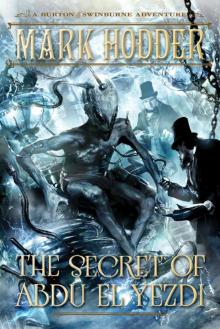 The Secret of Abdu El Yezdi
The Secret of Abdu El Yezdi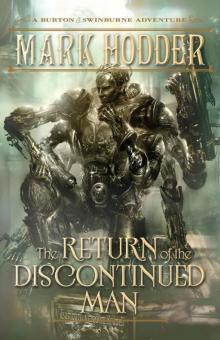 The Return of the Discontinued Man
The Return of the Discontinued Man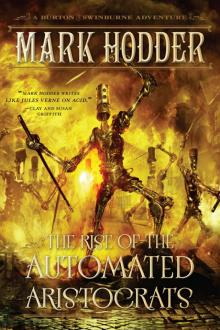 The Rise of the Automated Aristocrats
The Rise of the Automated Aristocrats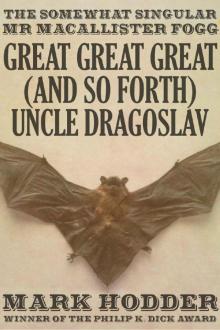 Macallister Fogg 2: Great Great Great (And So Forth) Uncle Dragoslav
Macallister Fogg 2: Great Great Great (And So Forth) Uncle Dragoslav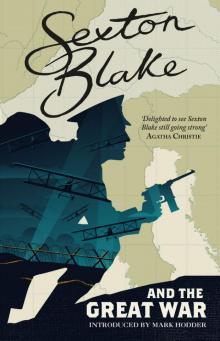 Sexton Blake and the Great War
Sexton Blake and the Great War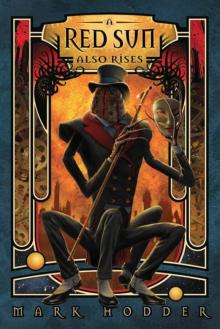 A Red Sun Also Rises
A Red Sun Also Rises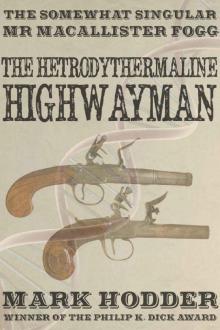 Macallister Fogg 3: The Hetrodythermaline Highwayman
Macallister Fogg 3: The Hetrodythermaline Highwayman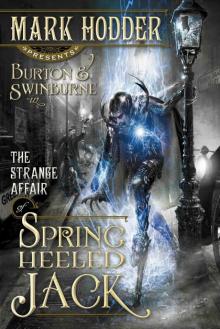 The Strange Affair of Spring Heeled Jack
The Strange Affair of Spring Heeled Jack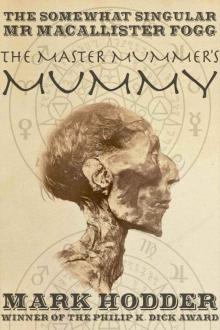 Macallister Fogg 1: The Master Mummer's Mummy (The Adventures of Macallister Fogg)
Macallister Fogg 1: The Master Mummer's Mummy (The Adventures of Macallister Fogg)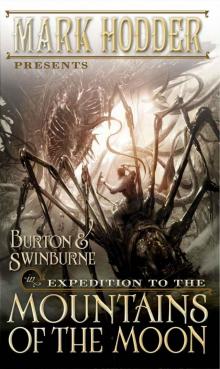 Expedition to the Mountains of the Moon bas-3
Expedition to the Mountains of the Moon bas-3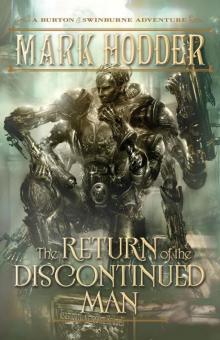 The Return of the Discontinued Man (A Burton & Swinburne Adventure)
The Return of the Discontinued Man (A Burton & Swinburne Adventure)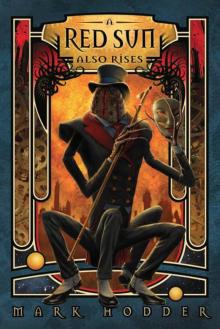 Red Sun Also Rises, A
Red Sun Also Rises, A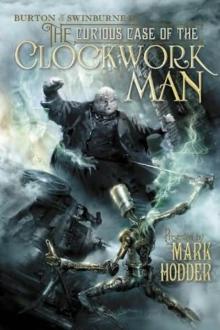 The curious case of the Clockwork Man bas-2
The curious case of the Clockwork Man bas-2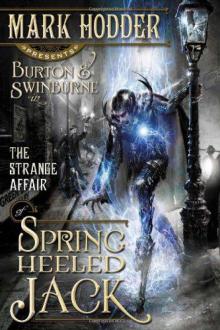 The strange affair of Spring-heeled Jack bas-1
The strange affair of Spring-heeled Jack bas-1